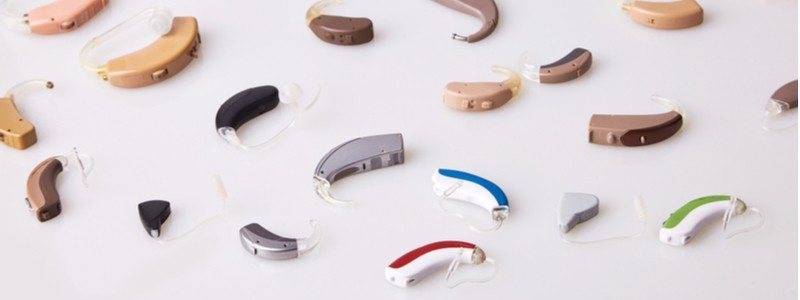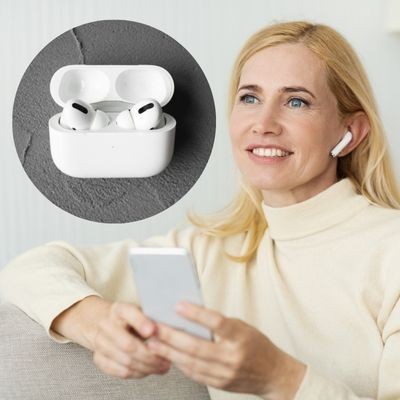
Head of Online Medical Content

Audiology Expert at Hearing Aid UK

Hearing Aid Manufacturers UK
Hearing aid manufacturers' comparison
What's the difference between a hearing aid manufacturer and a hearing aid retailer?
A question we are often asked by people who are looking to purchase hearing aids is, ‘What is the difference between a manufacturer and a retailer?’ A common misconception is that they are the same, but this is not the case.
A hearing aid manufacturer is a company that makes the instruments. They are also responsible for the design and new developments, and will hold the license for their products. The retailer is the company or person that sells the hearing aids.
When it comes to manufacturers, you must know who you are dealing with, as technology levels and the quality of the products can vary greatly. Many small manufacturers produce what seem to be lower-cost hearing aids, but the reason the products are cheaper is that the technology is far below the level you would receive from the larger manufacturers.
This is often because research and development are costly, and the smaller companies simply don’t have the resources to keep up with their larger competitors. Having said that, some smaller companies do produce high-quality specialist equipment that may not be available elsewhere.
At Hearing Aid UK, we recommend hearing aids from all the world’s leading hearing aid manufacturers. Much of the manufacturing of hearing aids these days is done overseas, but each of the manufacturers also has a base in the UK.
How many hearing aid manufacturers are there?
There are quite a few in the audiology industry, however, below are the main hearing aid manufacturers as a reference.
Hearing Aid Manufacturer BERNAFON
Company name: William Demant Holding
Overseas base: Denmark
UK base: Hamilton, South Lanarkshire
Hearing Aid Manufacturer OTICON
Company name: William Demant Holding
Overseas base: Denmark
UK base: Hamilton, South Lanarkshire
Hearing Aid Manufacturer PHONAK
Company name: Sonova Holding
Overseas base: Switzerland
UK base: Warrington, Cheshire
Hearing Aid Manufacturer RESOUND
Company name: GNReSound
Overseas base: Denmark
UK base: Oxford, Oxfordshire
Hearing Aid Manufacturer SIGNIA (formerly SIEMENS)
Company name: Siemens
Overseas base: Germany
UK base: Crawley, West Sussex
Hearing Aid Manufacturer STARKEY
Company name: Starkey
Overseas base: USA
UK base: Stockport, Greater Manchester
Hearing Aid Manufacturer UNITRON
Company name: Sonova Holding
Overseas base: Switzerland
UK base: Warrington, Cheshire
Hearing Aid Manufacturer WIDEX
Company name: Widex
Overseas base: Denmark
UK base: Chester, Cheshire
Hearing aid manufacturer affiliations
Over the years, many retailers have built affiliations with certain manufacturers and, in some cases, are partially owned by them. This is a selection of retailers that have ties to manufacturers:
Boots Hearing Care: (David Ormerod Hearing Centres) – The majority is owned by Sonova Holding (Phonak, Unitron).
Hidden Hearing: Owned by William Demant Holding (Bernafon, Oticon).
Bloom Hearing and Regional Hearing Services: Owned by Widex.
While this does not mean that you would necessarily receive substandard technology from these retailers, it does mean that you are likely to be offered a limited choice.
As they are affiliated with certain manufacturers, there is a good chance that they will recommend the company’s products first. (If you went to buy a car at a Mercedes dealership, they wouldn’t offer you a Ford!)
Another thing to watch for in these cases is that manufacturers will often use these retailers to clear their stocks of older technology by offering things like 2-for-1 deals. While this looks like a fantastic offer on the surface, you may not be getting the best technology available for what you are paying.
Why Choose Us?
- FREE Hearing Tests
- Best Hearing Aids and Prices
- FREE Aftercare for Life
- FREE Home Visits
- 200+ Local Audiologists
- 60 Day Money Back Guarantee
We can support you and your hearing locally
At Hearing Aid UK we work with professional, independent audiologists from all over the UK. Because they are independent, you can be sure that the advice you receive and the products they recommend are the right solution for you based on your hearing needs.
And if you want to know more about hearing aid manufacturers...
Our audiologists are happy to help and support you with any questions you may have about hearing aid manufacturers or any other areas of hearing healthcare free on 0800 567 7621
Hearing aid advice articles you might like...
 Do Hearing Aids Work for Everyone?
Do Hearing Aids Work for Everyone?  Wearing Hearing Aids with Glasses
Wearing Hearing Aids with Glasses  Risks of Wearing Apple AirPod Pro 2's
Risks of Wearing Apple AirPod Pro 2's What's included in our hearing aid prices?
Our specialist service includes:
Do not spend hundreds of pounds without getting a second opinion from us.
Please call us on 0800 567 7621
 Not only are the prices great, but the service is fantastic! Many thanks to your team.
Not only are the prices great, but the service is fantastic! Many thanks to your team.Common FAQs when researching hearing aids and hearing loss
If you are looking at this page then it is likely that an audiologist has suggested that you purchase this particular hearing aid, so is this the best model for you?
In general, any audiologist will always recommend to you the model that best suits your needs. Here is a useful checklist to make sure that is the case.
- Audiologist level of knowledge: The audiologist you have seen will hopefully have a wide knowledge of all available hearing aids, however, some will only be familiar with a small number of brands and therefore may not really be in a position to know which model is the best for you. It is OK to challenge their recommendation and ask them to justify why this particular brand is the one for you.
- Do research: Read about the hearing aid that was recommended. Does it seem like it will suit your lifestyle? Does it have more or fewer features than you need?
- Be aware of sales targets: Many high street retailers have specific tie-ins to a particular manufacturer/brand. The hearing aid they have suggested may still be the correct one for you, but do your research so that you know why they might have recommended it.
If in doubt, feel free to give us a call. That's what we're here for. In the meantime, read all about our review of the best hearing aids for 2025 here
If you have significant hearing loss in both ears, you should be wearing two hearing aids. Here are the audiological reasons why:
Localisation: The brain decodes information from both ears and compares and contrasts them. By analysing the minuscule time delays as well as the difference in the loudness of each sound reaching the ears, the person is able to accurately locate a sound source. Simply put, if you have better hearing on one side than the other, you can't accurately tell what direction sounds are coming from.
Less amplification is required: A phenomenon known as “binaural summation” means that the hearing aids can be set at a lower and more natural volume setting than if you wore only one hearing aid.
Head shadow effect: High frequencies, the part of your hearing that gives clarity and meaning to speech sounds, cannot bend around your head. Only low frequencies can. Therefore if someone is talking on your unaided side you are likely to hear that they are speaking, but be unable to tell what they have said.
Noise reduction: The brain has its own built-in noise reduction which is only really effective when it is receiving information from both ears. If only one ear is aided, even with the best hearing aid in the world, it will be difficult for you to hear in background noise as your brain is trying to retain all of the sounds (including background noise) rather than filtering it out.
Sound quality: We are designed to hear in stereo. Only hearing from one side sounds a lot less natural to us.
Fancy some further reading on this topic? You can read about why two hearing aids are better than one in our article, hearing aids for both ears, here
For most people, the main benefit of a rechargeable hearing aid is simple convenience. We are used to plugging in our phones and other devices overnight for them to charge up. Here are some other pros and cons:
For anybody with poor dexterity or issues with their fingers, having a rechargeable aid makes a huge difference as normal hearing aid batteries are quite small and some people find them fiddly to change.
One downside is that if you forget to charge your hearing aid, then it is a problem that can't be instantly fixed. For most a 30-minute charge will get you at least two or three hours of hearing, but if you are the type of person who is likely to forget to plug them in regularly then you're probably better off with standard batteries.
Rechargeable aids are also a little bit bigger and are only available in Behind the Ear models.
Finally, just like with a mobile phone, the amount of charge you get on day one is not going to be the same as you get a few years down the line. Be sure to ask what the policy is with the manufacturer warranty when it comes to replacing the battery.
Looking for more information on rechargeable hearing aids? Read our dedicated page on the topic here
For most people, the answer is yes. But it's never that simple.
The majority of hearing problems affect the high frequencies a lot more than the low ones. Therefore open fitting hearing aids sound a lot more natural and ones that block your ears up can make your own voice sound like you are talking with your head in a bucket. Therefore in-ear aids tend to be less natural.
However the true answer is we can't tell until we have had a look in your ears to assess the size of your ear canal, and until we have tested your hearing to see which frequencies are being affected.
People with wider ear canals tend to have more flexibility, also there are open fitting modular CIC hearing aids now that do not block your ears.
There is also the age old rule to consider, that a hearing aid will not help you if it's sat in the drawer gathering dust. If the only hearing aid you would be happy wearing is one that people can't see, then that's what you should get.
Most people can adapt to any type of hearing aid, as long as they know what to expect. Have an honest conversation with your audiologist as to what your needs are.
Generally speaking, six or more. Unless it's none at all.
The number of channels a hearing aid has is often a simplistic way an audiologist will use to explain why one hearing aid is better than another, but channels are complex and it is really not that straightforward. Here are some reasons why:
Hearing aids amplify sounds of different frequencies by different amounts. Most people have lost more high frequencies than low and therefore need more amplification in the high frequencies. The range of sounds you hear are split into frequency bands or channels and the hearing aids are set to provide the right amount of hearing at each frequency level.
Less than six channels and this cannot be done with much accuracy, so six is the magic number. However, a six channel aid is typically very basic with few other features and is suitable only for hearing a single speaker in a quiet room. The number of channels is not what you should be looking at, it's more the rest of the technology that comes with them.
As a final note, different manufacturers have different approaches. One method is not necessarily better than any other. For example, some manufacturers have as many as 64 channels in their top aids. Most tend to have between 17 and 20. One manufacturer has no channels at all.
Hearing aids are easily lost, misplaced or damaged and typically are one of the most expensive personal possessions an individual can own. We offer hearing aid warranty coverage for £80 per year per aid. Find out more about this service we provide here
All our audiologists use the very latest technology and provide the full range of tests to accurately measure your hearing for free. Find out about what hearing healthcare services we offer all our customers here
Hearing Aid UK offers all their customers free home visiting services, even in a care home environment, for no extra cost. Including hearing tests, fittings, maintenance, check-ups and much more in the comfort of your own home and at your convenience. Find out more information about our home visits here
Here, at Hearing Aid UK, we are dedicated to offering low hearing aid prices. We achieve this by having no head office and low marketing costs. Our hearing aid prices are amongst the lowest you will find anywhere in the world. Explore our prices, brands, and models here
Other pages you might find useful
Ask the Experts
6 Morton Lane
Walkwood
Redditch
Worcestershire
B97 5QA
Latest Launch
When we refer to a product as 'Latest Launch', we mean it is the latest to be released on the market.
New
When we refer to a product as 'New', we mean that the product is the newest hearing aid model on the market.
When we refer to a product as 'Superseded', we mean that there is a newer range available which replaces and improves on this product.
Older Model
When we refer to a product as an 'Older Model', we mean that it is has been superseded by at least two more recent hearing aid ranges.
